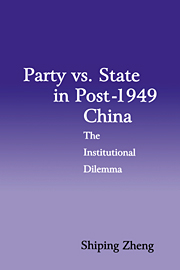Book contents
- Frontmatter
- Contents
- List of Tables
- Acknowledgments
- List of Abbreviations
- Part I Introduction
- Part II State-building under a Revolutionary Party: The Mao Zedong Era
- Part III State-building under a Reformist Party: The Deng Xiaoping Era
- Conclusions
- Appendix A CCP Membership Changes, 1921–96
- Appendix B Campaigns in China, 1950–89
- Bibliography
- Index
Conclusions
Published online by Cambridge University Press: 23 September 2009
- Frontmatter
- Contents
- List of Tables
- Acknowledgments
- List of Abbreviations
- Part I Introduction
- Part II State-building under a Revolutionary Party: The Mao Zedong Era
- Part III State-building under a Reformist Party: The Deng Xiaoping Era
- Conclusions
- Appendix A CCP Membership Changes, 1921–96
- Appendix B Campaigns in China, 1950–89
- Bibliography
- Index
Summary
THE main theme in this book is that the Chinese Communist Party has become the major obstacle to state-building in post-1949 China. After the imperial institutions collapsed in the first decades of this century, China was plunged into social chaos and political disintegration. In a desperate search for a modern form of state, the Chinese political elite and intellectuals experimented with many opposing ideological and organizational discourses. However, severe socioeconomic conditions, structural problems of governance, and frequent foreign invasions overwhelmed China. By 1949, only a strong revolutionary mass party had emerged from the civil war as the organizational force of China.
As the social and economic situation in China changed from war and revolution to economic construction, state institution-building became necessary, if not inevitable. The CCP leaders in the 1950s recognized this need and embarked upon ambitious plans for building a new Chinese state. Meanwhile, in a new environment, the Party's revolutionary ideology, organizational principle, and methods of mass mobilization, which had spelled the Party's success before 1949, became increasingly counterproductive to economic construction and political institutionalization. These features, however, proved to be difficult to change because they had been deeply built into the Party organization over many years of revolutionary warfare.
- Type
- Chapter
- Information
- Party vs. State in Post-1949 ChinaThe Institutional Dilemma, pp. 255 - 266Publisher: Cambridge University PressPrint publication year: 1997

